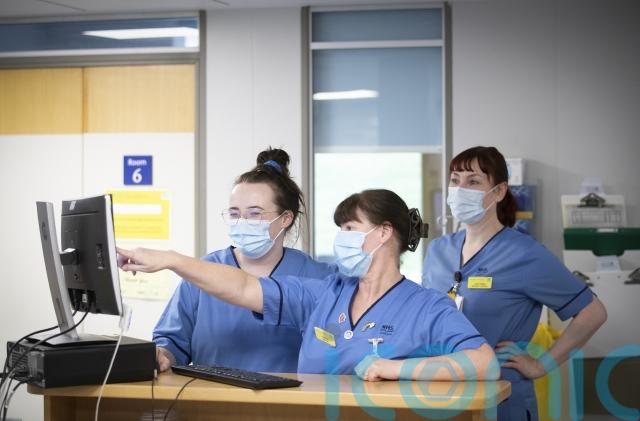
Doctors’ leaders have told how NHS staff in Scotland have been left “depleted, exhausted and facing burnout” as they spoke out about the “worryingly high” number of consultant posts that are lying empty.
New figures from Public Health Scotland showed that while the number of consultants employed in NHS Scotland had increased 2.3% over last year, to stand at 5,908.7 whole time equivalent (WTE) positions, the number of vacancies also rose.
At the end of December 2022 there were 413.2 WTE consultants’ jobs that were empty – with this up from 392.8 WTE at the end of September 2022.
Official figures showed that overall, the number of people employed in Scotland’s NHS rose by 0.1% over 2022, to 155,926.9 WTE at the end of the year – with this total up by 17.6% over the last decade.
But vacancies also fell, going from from 6,319.3 WTE at the end of September to 5,779.2 WTE by the end of the year.
Speaking about the vacancies for consultants, Dr Alan Robertson of the British Medical Association (BMA) said the total remained “worryingly high”.
Dr Robertson, the chair of the BMA’s Scottish Consultants Committee, added it was “concerning that these latest figures show a 5% increase in vacant posts from the last quarter – rising to 412 from 392”.
But he added that research by BMA Scotland at the end of last year “suggests that there are substantial numbers of vacancies not included in official figures, and the real figure is therefore likely to be much higher than this – in fact we believe it to be more than double”.
He continued: “Another huge cause for concern is the increase in the number of posts which have been vacant for six months or more – rising to 212 from 199 last quarter – suggesting that finding permanent staff to fill the gaps is proving to be significantly challenging.”
Staff sickness levels are now the highest since 2013, Dr Roberston added, saying this is a “potentially worrying sign of the impact the ongoing workforce and workload pressures are having on everyone working in our NHS”.
Describing the situation as “simply unsustainable”, he stated: “Once again, I am sure we will hear that NHS staffing levels are at a record high.
“But saying this to staff on the ground who are depleted, exhausted and facing burnout is not just demoralising but incredibly insulting.
“Staff are working flat out, doing absolutely everything they can to cope with rising demand which is spiralling rapidly out of control.”
Delivering a stark message to Scotland’s political leaders, Dr Robertson was clear that “just because there are more people on the payroll than before, does not mean there is enough”.
He added: “The consultant workforce has been stretched to its limit over the past few years and staff shortages are affecting the ability of doctors to deliver the high-quality patient care they strive for.
“I’ll say it again for anyone who still doesn’t understand – we don’t have enough doctors in Scotland to effectively staff our NHS and deliver all that is being asked of us.”
He told how the workforce was now “running on empty”, adding: “There is simply nothing left to give.”

Meanwhile, Colin Poolman, director of the Royal College of Nursing (RCN) Scotland, said: “Thousands of registered nurses are missing from teams across Scotland, impacting on the safety and quality of patient care and putting even more pressure on staff who are already working extra unpaid hours to cover gaps and going home feeling that they are unable to provide the quality of care they want.”
With the Scottish Government having recently announced plans for a Nursing and Midwifery Taskforce, he said this was “much needed if the nursing workforce crisis is to be addressed”.
Mr Poolman added: “Scottish Government, employers and education providers must work with the Royal College of Nursing to look at how Scotland can retain experienced nursing staff, develop new routes into the profession and ensure nursing is a career of choice once again.
“The next first minister must prioritise the work of the taskforce and see it through effectively to secure the nursing workforce Scotland needs.”
Health Secretary Humza Yousaf stressed NHS staffing was “at a historically high level”, with record numbers of medical and dental staff as well as allied health professionals.
He added: “We also continue to train more medical professionals. In the last eight years the number of available medical school places at Scottish universities will have increased by 55%, an extra 469 places, to a record high of 1,317.
“We have substantially more nurses per head of population than is the case in NHS England. Our latest pay offer of an average 6.5% increase for 2023-24, as part of £568 million of new investment, ensures that they are the best paid in the UK.
“In fact, the UK Government would need to give NHS nurses in England a 14% pay rise to match the pay we’re offering in Scotland.”
Subscribe or register today to discover more from DonegalLive.ie
Buy the e-paper of the Donegal Democrat, Donegal People's Press, Donegal Post and Inish Times here for instant access to Donegal's premier news titles.
Keep up with the latest news from Donegal with our daily newsletter featuring the most important stories of the day delivered to your inbox every evening at 5pm.